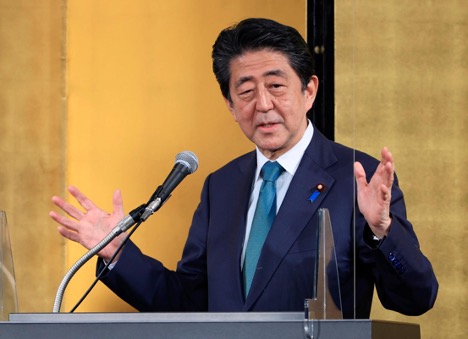
by Editor BGF | May 18, 2025 | Shinzo Abe Initiative for Peace and Security, News
The trial of a man accused of assassinating former Prime Minister Shinzo Abe in 2022 is expected to begin on Oct 28, sources at the Nara District Court said on Thursday.
Tetsuya Yamagami, 44, is accused of fatally shooting Abe with a homemade gun while he gave a speech at an election campaign rally in front of Kintetsu Yamato-Saidaiji Station in Nara City on July 8, 2022.
The trial is expected to be heard by lay judges, NHK reported. So far, six “pretrial arrangement procedures” have been conducted since October 2023, in which the court, prosecutors and defense team narrowed down the evidence and issues to be raised. A seventh procedure is scheduled to take place on May 27.
Yamagami has told police that he shot Abe out of a growing resentment toward the World Peace Unification Family (formerly the Unification Church), to which his mother had made large donations 20 years earlier. He said he targeted Abe because of his perceived links to the church.
Yamagami has also been indicted on charges of violating the Weapons Manufacturing Act, the Explosives Control Act, as well as the Swords and Firearms Control Act for manufacturing multiple guns and gunpowder without a license.
A psychiatric evaluation of Yamagami concluded last June that he was mentally fit to be held criminally responsible for his actions. The defense did not contest the results of the evaluation.
The trial is expected to last about three months with a verdict likely in January 2026.
https://japantoday.com/category/crime/trial-of-former-pm-abe%E2%80%99s-accused-killer-expected-to-begin-on-oct-28


by Editor BGF | May 18, 2025 | World Leader for Peace and Security, News, World Leaders in AIWS Award Updates
Audrey Tang, 2025 World Leader in AIWS Award Recipient, coauthored an essay highlighting the need for AI tools that support meaningful civic discourse in the face of rampant polarization and mistrust.
The essay is part of a series published by McGill’s Centre for Media, Technology, and Democracy, Mila, and the Canadian Institute for Advanced Research. The full series is accessible here.
Democracy has undergone profound changes over the past decade, shaped by rapid technological, social, and political transformations. Across the globe, citizens are demanding more meaningful and sustained engagement in governance—especially around emerging technologies like artificial intelligence (AI), which increasingly shape the contours of public life.
From world-leading experts in deliberative democracy, civic technology, and AI governance we introduce a seven-part essay series exploring how deliberative democratic processes like citizen’s assemblies and civic tech can strengthen AI governance. The essays follow from a workshop on “Democratic Legitimacy for AI: Deliberative Approaches to Inclusive Governance” held in Vancouver in March 2025, in partnership with Simon Fraser University’s Morris J. Wosk Centre for Dialogue.
https://www.mediatechdemocracy.com/deliberative-approaches-to-inclusive-governance

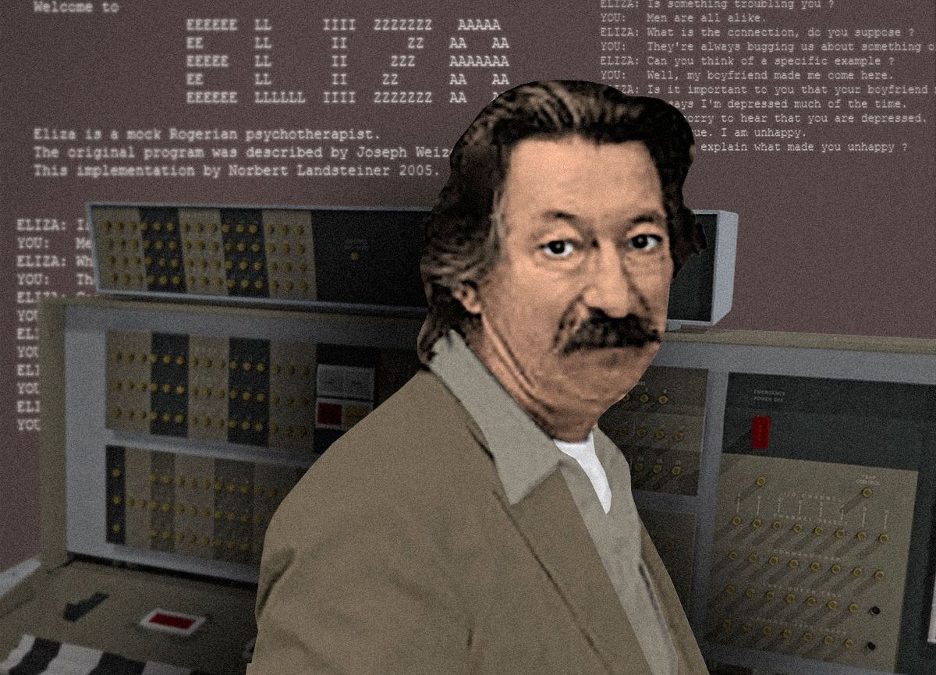
by Editor BGF | May 18, 2025 | News
1966: ELIZA, the first chatbot, is created by Joseph Weizenbaum at MIT. ELIZA simulates a Rogerian psychotherapist and demonstrates the potential of simple natural language processing techniques.
ELIZA, an early natural language processing program, was designed to simulate a conversation with a human, and it became famous for its “DOCTOR” script, which mimicked a non-directive psychotherapist. The program used pattern matching and substitution rules to generate responses, rather than genuine understanding of the conversation.
ELIZA’s impact was significant because it demonstrated the potential of AI to engage in human-like conversation, and it sparked discussions about the ethical implications of AI. Weizenbaum’s work with ELIZA also led to the “ELIZA effect,” where users tend to attribute human qualities like intelligence and empathy to programs that are able to simulate conversation.

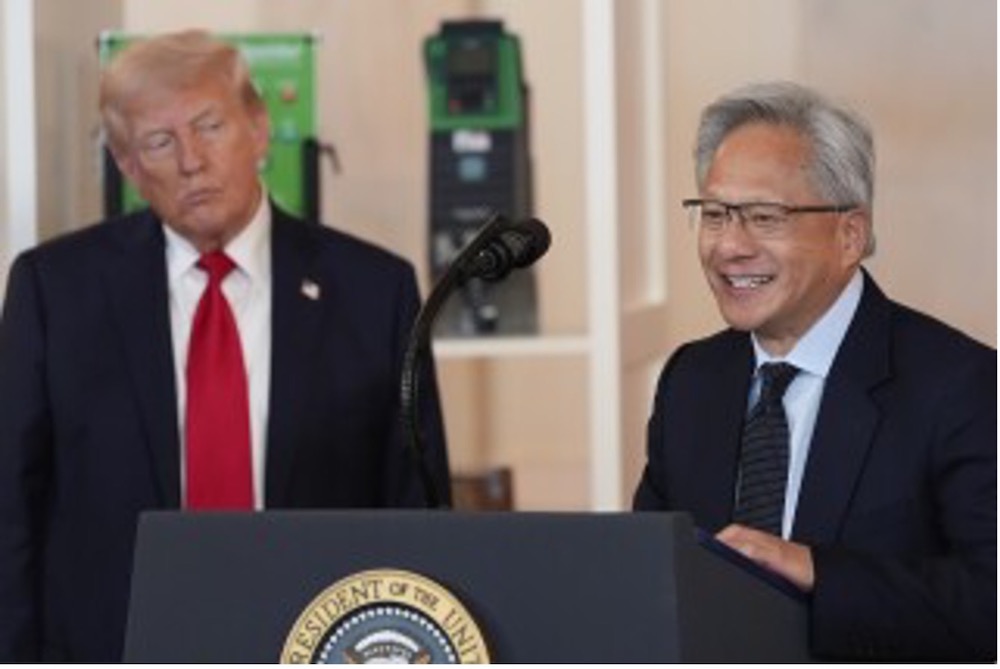
by Editor BGF | May 18, 2025 | Global Alliance for Digital Governance
Responding to complaints from the tech industry and other countries, the U.S. Department of Commerce has rescinded a Biden-era rule due to take effect Thursday that placed limits on the number of artificial intelligence chips that could be exported to certain international markets without federal approval.
“These new requirements would have stifled American innovation and saddled companies with burdensome new regulatory requirements,” the Commerce Department stated in its guidance.
President Joe Biden established the export framework shortly before he left office in an attempt to balance national security concerns about the technology with the economic interests of producers and other countries. While the United States had already restricted exports to adversaries such as China and Russia, some of those controls had loopholes and the rule would have set limits on a much broader group of countries, including Middle Eastern countries that President Donald Trump visited last week.
The Biden rule’s sorting more than 100 countries into different tiers of export restrictions drew strong opposition from those countries, as well as U.S. chipmakers like Nvidia and Advanced Micro Devices. They argued the restrictions could actually push some countries to turn to China instead of the U.S. for their AI technology.
What Biden’s rule did “was send a message to 120 nations that they couldn’t necessarily count on us to provide the AI they want and need,” said Brad Smith, Microsoft’s president, at a U.S. Senate hearing last week.
Commerce Undersecretary Jeffery Kessler said Tuesday that President Donald Trump’s administration will work to replace the now-rescinded rule to pursue AI with “trusted foreign countries around the world, while keeping the technology out of the hands of our adversaries.” The administration said a replacement rule is coming in the future but hasn’t said what the new rule will say.
The European Commission welcomed the change, said spokesperson Thomas Regnier, arguing that the Biden rule, if it took effect, would “undermine U.S. diplomatic relations with dozens of countries by downgrading them to second-tier status.”
European Union countries should be able to buy advanced AI chips from the U.S. without limitations, Regnier said.
“We cooperate closely, in particular in the field of security, and represent an economic opportunity for the U.S., not a security risk,” he said in a statement.
https://www.cbs42.com/news/politics/ap-politics/ap-trump-administration-rescinds-curbs-on-ai-chip-exports-to-foreign-markets/
https://apnews.com/article/trump-biden-ai-chip-export-curbs-rescinded-bb05a9760abb8a320a447f58599e2ab6
https://time.com/7285232/trump-ai-middle-east-chip-export/
https://www.nytimes.com/2025/05/15/business/economy/trump-chips-ai-uae.html

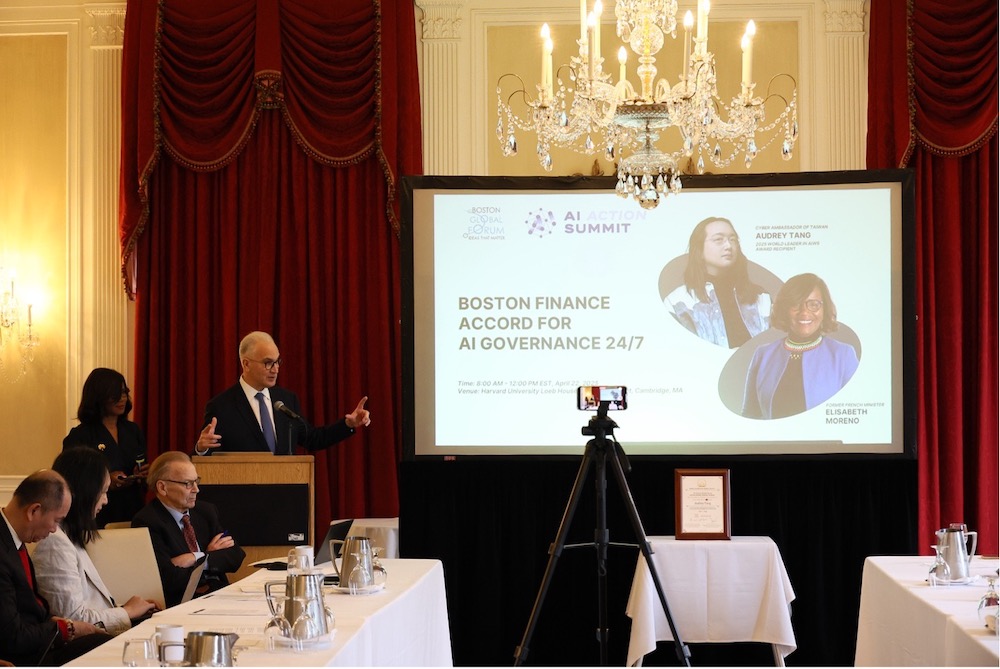
by Editor BGF | May 11, 2025 | Papers & Reports, News, Publications
Remarks by Hon. Mark Kennedy
Director, Wahba Institute for Strategic Competition
Delivered April 22, 2025 at Boston Global Forum Conference at Harvard University’s Loeb House
A profound realignment is underway—not just in global politics, but in global technology. The world is dividing digitally.
China is accelerating this divide. Its cybersecurity and data laws compel firms to share sensitive information with the state while concealing that access from the world. Its civil-military fusion is fueling an AI-powered buildup with global consequences. The United States has rightly responded—not, as Lenin warned, by selling the rope by which we would be hanged—but by restricting the export of advanced chips and compute infrastructure.
Yet this is not merely a competition of technologies—it is a contest of systems. The question isn’t just who has the fastest model, but who shapes the digital future: its rules, its reach, and its values.
As Secretary Raimondo has made clear, it is no longer realistic for nations to fully participate in both the American and Chinese tech ecosystems. A split is underway. A two-way race has begun.
No third digital pole can match the scale of China or the United States. Only these two powers combine frontier models, advanced compute, and global cloud reach. Here, the U.S. holds a decisive edge: the majority of digital content, scientific research, and training data is in English. That gives American-aligned models a structural advantage in reasoning and global relevance.
The race is ours to lose, but we could still fumble the future if we fail to act strategically.
To win, five steps must guide our AI diplomacy.
Step 1: Build a Trusted Alliance, Not a Fragmented Ecosystem
The Boston Global Forum’s New Economic Alliance reflects a central truth: we cannot go it alone. The U.S. must deepen its partnerships with traditional allies like the UK, Japan, South Korea, and the EU; forge tighter bonds with India; and elevate relationships with rising powers like Vietnam, Brazil, and Kenya.
But two internal risks could fracture this coalition from within.
First, the European Union’s drive to be a regulatory superpower threatens to divide the democratic tech space. While well-intentioned, overly rigid AI rules risk stifling innovation and creating incompatibilities with trusted partners. The answer is not regulatory convergence, but interoperability—allowing systems to work together securely, upholding rights and safety while encouraging innovation.
That’s why the Wahba Institute convened a roundtable in Geneva alongside the WTO’s Global Forum: to explore how we ensure democratic models of AI leadership can remain dynamic, responsive, and aligned across borders.
Step 2: Balance Security with Access
Second, the United States risks overcorrecting. Our export controls currently allow unrestricted chip access to just 18 countries. Left out are 22 NATO allies, India, Israel, and others who could and should be part of our trusted ecosystem. Every country America excludes, China will include.
Security and market access must go hand in hand. Restricting too much, too fast, may undercut U.S. firms, cede ground to China, and drive neutral countries toward Beijing’s orbit.
That’s why we must establish clear, credible pathways for nations to earn access to U.S. models and infrastructure—especially those already aligned with our security interests. Global trust in U.S. companies is a strategic asset. We must not squander it.
Step 3: Lead with a Trusted Open Model
China is not just exporting hardware. It is exporting influence—through code, cloud, and AI models. DeepSeek, Beijing’s open-source large language model, is a prime example. Technically impressive and low-cost, it markets “openness” while tethering its users to censored data, Chinese infrastructure, and continuous dependency.
It follows the Huawei playbook—data absorption disguised as digital inclusion. That is not empowerment. It is entrapment.
To counter this, leaders like Sam Altman and Eric Schmidt have urged the U.S. to back a trusted open-source alternative—one aligned with democratic values, transparent in training, and safe by design. Models like Meta’s LLaMA offer a foundation. America must explore whether with safety guardrails open models can enable trusted partners to innovate responsibly—within an ecosystem that reflects our values.
Whether open or closed, the U.S. must ensure its companies remain the global default—through capability, trust, and accessibility. That requires strategic openness, not reflexive restriction.
Step 4: Extend Shared Infrastructure
Emerging markets want to align with Western technology —but cannot build alone. If we do not help them construct their digital futures, China will gladly sell them one.
We must support shared AI infrastructure across regions like Southeast Asia, Latin America, and Africa. That means co-investing in cloud services, compute access, technical training, and local data governance standards. It means empowering nations to lead their own development while remaining in a trusted, rights-respecting digital sphere.
This is not charity. It is strategy.
Step 5: Embed AI in Economic Statecraft
Finally, we must recognize AI as a pillar of geoeconomic strategy—not just a technical sector. AI will shape trade flows, supply chains, talent development, and alliance structures. It must be embedded in our foreign policy, our coalition-building efforts, and our development assistance agenda.
Unlike China’s state-fused model, America’s innovation system is decentralized, pluralistic, and open. That is a competitive advantage. But we must empower U.S. firms to operate globally in a way that advances the shared interest in a free and trusted digital future.
We must also make a simple distinction clear to the world: U.S. companies are not arms of the state. They are innovators, collaborators, and catalysts of opportunity—not enforcers of central control.
In conclusion:
The Boston Global Forum’s New Economic Alliance captures the challenge and the opportunity. AI is not just a technology. It is a test—of whether open societies can cooperate at the speed of innovation.
To pass that test, we must do more than set standards.
We must share tools.
We must share compute.
We must share responsibility.
And we must lead not just through innovation—but through engagement.
Thank you.


by Editor BGF | May 12, 2025 | World Leader for Peace and Security, News, World Leaders in AIWS Award Updates
The memorial service for Kitty Dukakis, a relentless mental health advocate and Former Massachusetts first lady, focused on her life as a powerful and influential woman who loved and believed in all people.
The service took place at Brookline High School, where Kitty and Michael Dukakis first met and where their kids also graduated from. While it wasn’t intentional, the service took place on Mother’s Day (May 11, 2025), something many speakers said was most fitting, as she was there for everyone, like a mother.
In place of flowers, the family suggested donations to the Jobie Project Fund, which funds pediatric brain tumor research at the Dana-Farber Cancer Institute, to honor Jobie Hereford, Dukakis’s granddaughter, who died from a brain tumor at 22 years old.
The family also suggested donating to RefugePoint, a humanitarian aid organization supporting refugees, a cause important to Kitty Dukakis, the founder of which also spoke at the service.
Kitty Dukakis‘s youngest, Kara, remembered all the car rides with her mom — the cigarettes her mom smoked even if it was too cold to put the windows down, how she loved to sing in the car and joked about her mom’s serious road rage.

Please see full here: https://www.bostonglobe.com/2025/05/11/metro/kitty-dukakis-mental-health-advocate-memorial/
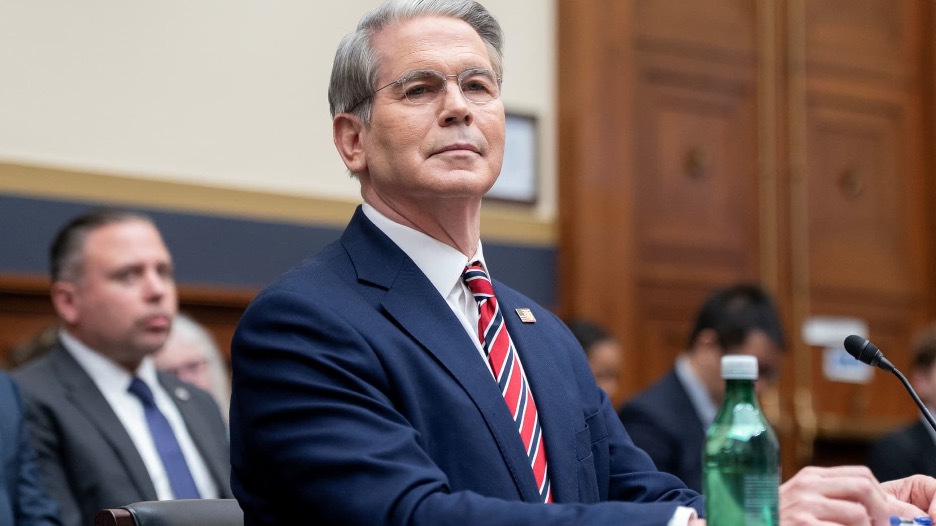
by Editor BGF | May 12, 2025 | News
The U.S. and China ended high-stakes trade talks on a positive note on Sunday, with U.S. officials touting a “deal” to reduce the U.S. trade deficit, while Chinese officials said the sides had reached “important consensus” and agreed to launch another new economic dialogue forum.
Neither side released details after they wrapped up two days of talks in Switzerland.
U.S. Treasury Secretary Scott Bessent and Trade Representative Jamieson Greer described “substantial progress” and also said details would be announced on Monday.
In separate briefings with reporters, neither side mentioned any agreement to cut U.S. tariffs of 145% on Chinese goods and China’s 125% tariffs on U.S. goods.
Greer and Bessent took no questions from reporters. The U.S. Treasury chief has said previously that these duties amount to a trade embargo between the world’s two largest economies and need to be “de-escalated.”
Chinese Vice Premier He Lifeng said a joint statement would be released in Geneva on Monday. Vice Commerce Minister Li Chenggang said it would contain “good news for the world.”
Please see full here:
https://www.reuters.com/world/china/us-china-talks-defuse-trade-row-resume-geneva-2025-05-11/
https://www.cnbc.com/2025/05/11/us-china-trade-tariffs-talks.html

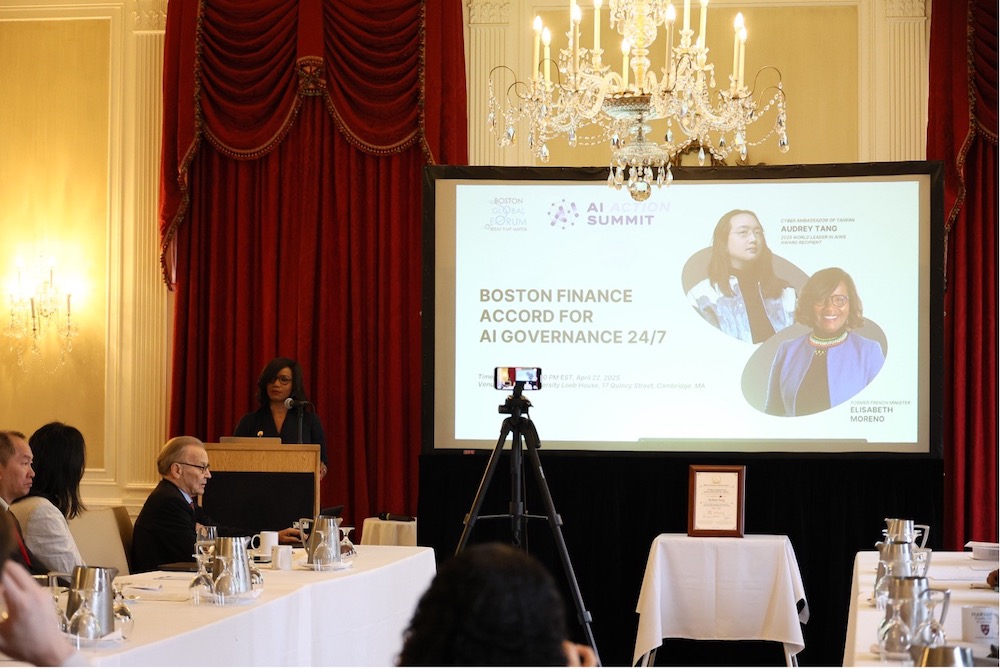
by Editor BGF | May 12, 2025 | News, Shaping Futures
Finance shapes the world.
The only question is: in which direction?
Every investment decision, every capital allocation is a political act.
In 2025, amid accelerating climate, social, and geopolitical crises, continuing to finance without ethics is not just irresponsible — it is suicidal.
Neutrality is no longer an option.
Responsibility must become the norm.
For too long, finance saw itself as an external referee, detached from real-world consequences.
Today, the facts are undeniable:
- 90% of carbon emissions are linked to economic and financial decisions.
- Unequal access to finance deepens social divides.
- Lack of transparency fuels speculation and systemic crises.
- 1% of the population now owns nearly twice as much wealth as the remaining 99% combined (Oxfam, 2024).
- Global debt has reached a record $315 trillion, or 336% of global GDP (Institute of International Finance, 2025).
- 72% of citizens in G20 countries believe the financial system is unfair and serves only the most powerful (Edelman Trust Barometer, 2024).
To continue as before is to betray future generations.
The dominance of rent-seeking speculation — where financial gains are pursued without creating real economic or social value — has widened inequalities and fueled public distrust.
In contrast, responsible finance is rooted in value creation: investing in innovation, sustainability, and human potential.
The choice is clear: we can continue feeding a system that extracts without building, or we can finance a future that restores balance, opportunity, and trust.
But another path is possible.
A different kind of finance is already emerging.
On April 22nd, during a high-level conference at Harvard University, leading scholars, policymakers, and business leaders came together to sign the Boston Finance Accord for 24/7 AI Governance — a foundational declaration for building a new global order anchored in ethics, transparency, and inclusion.
This text follows that milestone moment.
That same day, the Boston Ethics Finance Protocol (BEFP), developed by experts from Harvard and MIT, was officially presented.
This document is not just a reform.
It is a renaissance — aiming to return finance to its true mission: serving the common good, rebuilding trust, and restoring hope — 24 hours a day, 7 days a week.
Through the BEFP, we are laying the foundation for a responsible financial revolution:
- 90% bias-free financial decisions by 2028.
- 100% blockchain traceability for every transaction.
- 20% increased access to finance for underserved populations.
- 50 cybersecurity hubs to ensure digital financial stability.
These are not promises.
These are measurable, verifiable commitments.
Today, we issue a clear call to action:
- To investors: demand real, audited ESG standards — not greenwashing.
- To corporations: align your business models with planetary boundaries and societal needs.
- To governments: accelerate the adoption of global ethical finance standards, starting with the G7 and G20.
Because there are only two futures ahead:
One driven by greed and fragmentation.
Or one built on responsibility, transparency, and equity.
The time to act is not tomorrow. It is today.
And finance can no longer afford to be a spectator.
It must become the architect of a sustainable future.
Responsibility or chaos.
The choice is ours.
The time is now.
Michael Dukakis, Former Governor of Massachusetts, Co-Founder of the Boston Global Forum.
Élisabeth Moreno, Chairwoman of Ring Capital, former Minister for Gender Equality, Diversity, and Equal Opportunities (France).


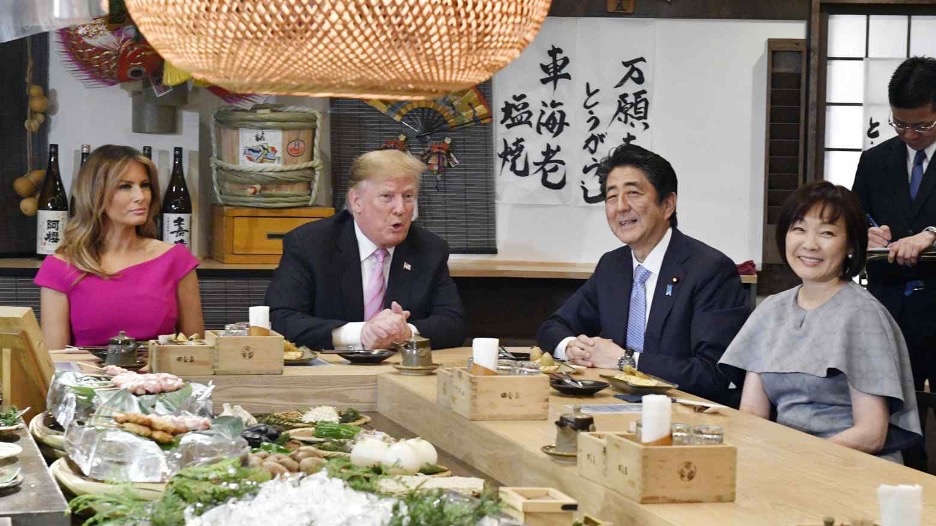
by Editor BGF | May 12, 2025 | Shinzo Abe Initiative for Peace and Security, News
PMs from Abe to Ishiba have tailored state dinners to individual foreign leaders

As Japan faces a security environment that Prime Minister Shigeru Ishiba says is the most complex since the end of World War II, the country has been relying on a diplomatic tactic it has long favored: the quickest way to a leader’s heart is through their stomach.
When former Prime Minister Shinzo Abe was trying to build a relationship of trust with U.S. President Donald Trump during the latter’s first term, he used food in addition to golf.
During Trump and first lady Melania Trump’s visit to Japan in 2019 as state guests, Abe and his wife hosted them at a restaurant in Tokyo’s upscale Roppongi district specializing in robatayaki — Japanese fireside cooking, with open kitchens and simple preparations.
Considering Trump’s preference for fast food, Abe decided that a restaurant more casual than kaiseki, but which still had a distinctly Japanese atmosphere, would be better. Trump feasted on baked potatoes with butter and wagyu steak.
When it comes to diplomacy, hard power, like military and economic strength, alone cannot win over international public opinion. Soft power that improves a country’s image and increases its fan base is becoming increasingly important.
“Diplomatic meals are important opportunities to exchange information and opinions with other countries,” said former Ambassador to Canada Kenjiro Monji. “Inviting someone to a meal at the ambassador’s residence, or at home, instantly increases the sense of intimacy with the other person.”

Please see full here: https://asia.nikkei.com/Politics/International-relations/Sushi-diplomacy-Japan-s-foreign-relations-trump-card-is-its-food













